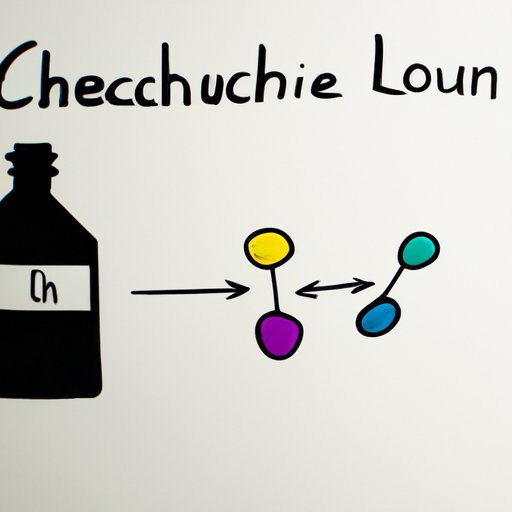Introduction
Cough medicine is a type of medication used to treat a variety of upper respiratory illnesses, from the common cold to bronchitis. It is typically used to reduce the severity of symptoms such as coughing, congestion, and sore throat. While there are many over-the-counter (OTC) medications available, it is important to understand how they work before taking them. This article will provide a comprehensive guide to how cough medicine works, including an exploration of the science behind it and a closer look at the chemistry of different types of cough medicine. It will also outline natural remedies that can help treat a cough.

Exploring the Science Behind Cough Medicine
To understand how cough medicine works, it is important to first explore the science behind it. The primary function of cough medicine is to reduce symptoms associated with a cough. To do this, it needs to target the receptors in the brain that control coughing.
Understanding How Cough Receptors Work
The brain contains specialized receptors that respond to chemical signals that trigger a cough reflex. These receptors are activated when the body is exposed to irritants or allergens, such as dust, smoke, or pollen. When the receptors are activated, they signal the brain to initiate a coughing response.
Exploring How Cough Medicine Works to Reduce Symptoms
Cough medicine works by targeting these receptors and reducing their sensitivity. This reduces the likelihood of a coughing response being triggered, thereby reducing the severity of symptoms. In addition, some cough medicines contain ingredients that act as expectorants or decongestants, which can help to thin mucus and reduce congestion.
A Comprehensive Guide to How Different Types of Cough Medicine Work
There are several types of OTC cough medicine available, each of which works differently to reduce symptoms.
Syrups, Lozenges, and Sprays
Syrups, lozenges, and sprays are designed to be taken orally. They typically contain ingredients such as dextromethorphan, which acts as a cough suppressant by targeting the cough receptors in the brain. Some syrups also contain expectorants, which help to thin mucus and reduce congestion.
Expectorants and Decongestants
Expectorants and decongestants are designed to thin mucus and reduce congestion. Expectorants contain ingredients such as guaifenesin, which helps to break down mucus and make it easier to expel. Decongestants contain ingredients such as pseudoephedrine, which helps to reduce swelling in the nasal passages.
Antihistamines
Antihistamines are typically used to treat allergies, but they can also be used to treat a cough. They contain ingredients such as diphenhydramine, which works to reduce inflammation in the airways and reduce the frequency of coughing.

The Chemistry of Cough Medicine: A Closer Look
To gain a better understanding of how cough medicine works, it is important to examine the ingredients in cough medicine and their effects.
Examining the Ingredients in Cough Medicine and Their Effects
The primary ingredients in most cough medicines are expectorants, decongestants, and antihistamines. Expectorants help to thin mucus and make it easier to expel. Decongestants reduce swelling in the nasal passages. Antihistamines reduce inflammation in the airways and reduce the frequency of coughing.
Investigating the Role of Expectorants and Decongestants in Cough Medicine
Expectorants and decongestants work to thin mucus and reduce congestion. They can be found in syrups, lozenges, and sprays. Expectorants contain ingredients such as guaifenesin, which helps to break down mucus and make it easier to expel. Decongestants contain ingredients such as pseudoephedrine, which helps to reduce swelling in the nasal passages.
Understanding the Benefits of Antihistamines in Cough Medicine
Antihistamines are typically used to treat allergies, but they can also be used to treat a cough. They contain ingredients such as diphenhydramine, which works to reduce inflammation in the airways and reduce the frequency of coughing. They can be found in syrups, lozenges, and sprays.

An Overview of How Natural Remedies Can Help Treat a Cough
In addition to OTC medications, there are several natural remedies that can help to reduce the severity of a cough.
Herbs, Teas, and Honey
Herbal teas and honey can provide soothing relief for a sore throat. Herbal teas such as chamomile and ginger can help to reduce inflammation and soothe a sore throat. Honey has antibacterial properties and can help to reduce irritation in the throat.
Essential Oils
Essential oils, such as eucalyptus and peppermint, can be used to reduce inflammation in the airways and reduce the frequency of coughing. They can be added to a diffuser or a steam inhalation.
Steam Inhalation
Steam inhalation is a simple and effective way to reduce congestion and loosen mucus. It can be done by adding a few drops of essential oil to a bowl of hot water, covering your head with a towel, and inhaling the steam.
Conclusion
Cough medicine is a type of medication used to reduce the severity of symptoms associated with a cough. It works by targeting the receptors in the brain that control coughing and reducing their sensitivity. There are several types of OTC cough medicine available, each of which works differently to reduce symptoms. In addition, there are several natural remedies that can help to reduce the severity of a cough. This article provided a comprehensive guide to how cough medicine works, including an exploration of the science behind it and a closer look at the chemistry of different types of cough medicine. It also outlined natural remedies that can help treat a cough.
(Note: Is this article not meeting your expectations? Do you have knowledge or insights to share? Unlock new opportunities and expand your reach by joining our authors team. Click Registration to join us and share your expertise with our readers.)
